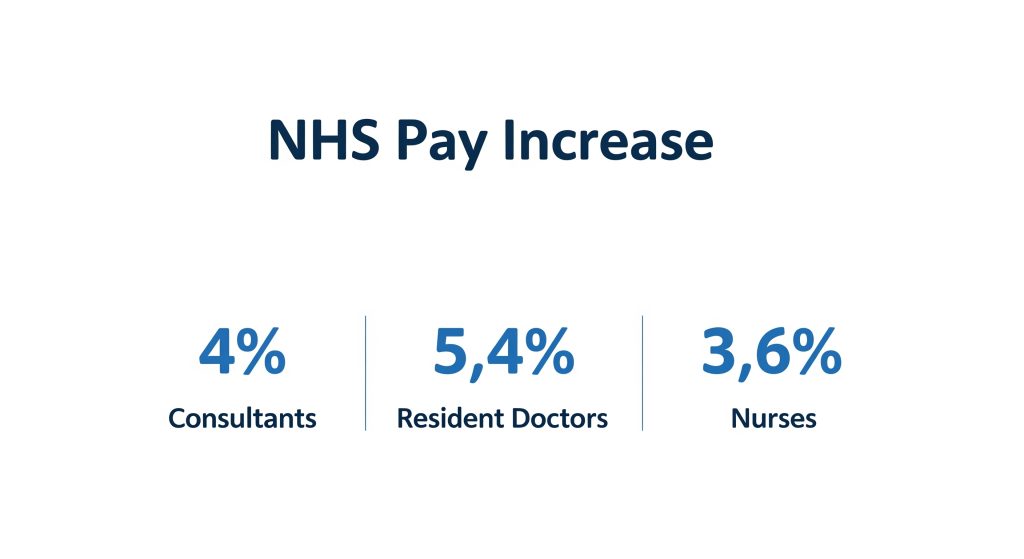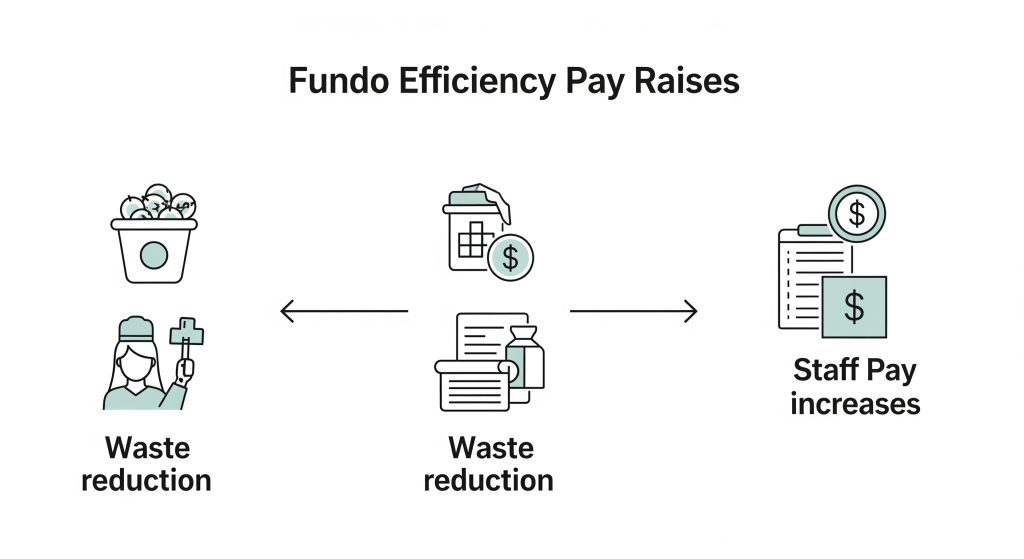NHS workers across England are celebrating substantial NHS pay rises for the second year running. Health Secretary Wes Streeting has accepted comprehensive pay review body recommendations. Furthermore, the announcement of these NHS pay rises marks a significant milestone in the government’s efforts. Additionally, these increases address years of pay erosion within the health service.
Comprehensive NHS Pay Rises Across All Staff Groups
The NHS pay rises deliver meaningful increases across every level of the health service workforce. Specifically, consultants, specialty doctors, specialists, and GPs will receive a 4% pay rise. Meanwhile, dentists benefit from additional contract uplifts to boost their compensation packages.
Resident doctors see their earnings increase by an average of 5.4%. This comprises a 4% base rise plus a consolidated payment of £750. Consequently, this targeted approach recognises the particular pressures facing junior medical staff. Moreover, it maintains fairness across the profession.
Agenda for Change (AfC) staff secure a 3.6% pay increase. This includes nurses, health visitors, midwives, ambulance personnel, porters, and cleaners. Therefore, these NHS pay rises demonstrate the government’s commitment to valuing every member. Indeed, this applies regardless of their role or seniority.

Transformative Impact on NHS Staff Earnings from Pay Rises
The cumulative effect of recent NHS pay rises reveals remarkable progress. This addresses historical pay stagnation effectively. For example, nursing starting salaries exemplify this transformation clearly. They have risen from £27,055 in 2022-23 to approximately £31,050 this year. As a result, this represents a £4,000 increase over three years.
This substantial improvement directly addresses recruitment and retention challenges. These have plagued the NHS for years. Furthermore, by offering competitive compensation packages through these NHS pay rises, the health service becomes more attractive. This applies to both new graduates and experienced professionals considering career changes.
The NHS pay rises also acknowledge the exceptional demands placed on NHS workers. This recognition comes during recent challenging periods. Additionally, these increases recognise their resilience and dedication in maintaining patient care standards. This occurred despite unprecedented pressures.
Strategic Funding Through Efficiency Improvements for Pay Rises
Rather than reducing frontline services to fund these NHS pay rises, the Department took a different approach. Instead, they identified savings through systematic efficiency improvements across the health system.
Eliminating Duplication and Bureaucracy
The funding strategy targets wasteful spending and unnecessary administrative layers. These drain resources from patient care. Key savings areas include:
Streamlined Operations: First, cutting duplication between the Department of Health and NHS England eliminates overlapping functions. Additionally, this reduces administrative burden.
Workforce Optimisation: Similarly, reducing NHS England headcount focuses resources on essential functions. However, this maintains operational effectiveness.
Corporate Service Reductions: Furthermore, slashing budgets for corporate services prioritises patient-facing activities. This includes NHS communications teams. Consequently, this approach reduces administrative overhead.
Integrated Care Board Efficiency: Finally, bringing down integrated care board costs by 50% demonstrates commitment. This reduces management expenses whilst preserving clinical services.
These reforms align with broader efficiency initiatives. For instance, the recent success in reducing NHS agency spending by nearly £1 billion through strategic workforce management helps fund these NHS pay rises.

Enhanced Payment Timeline Benefits Staff with Faster Pay Rises
NHS workers will receive their NHS pay rises more quickly than in previous years. All uplifts are backdated to 1 April and will appear in pay packets from August. This is two months earlier than last year’s implementation.
This accelerated timeline reflects the government’s recognition that timely NHS pay rises matter. They affect staff financial planning and morale significantly. Moreover, the commitment to faster implementation acknowledges an important issue. Delayed pay increases create uncertainty and frustration among healthcare workers.
Future improvements aim to align the pay award process more closely with the financial year. Therefore, this provides greater predictability and faster implementation for NHS staff compensation adjustments.
Pay Structure Reform for Long-term Sustainability
Beyond immediate pay increases, the government accepts pay review body recommendations for comprehensive pay structure reform. This will occur within the Agenda for Change framework. Furthermore, this reform will address outstanding concerns about banding and progression within the current system.
The NHS Staff Council will undertake this reform next year. They will work collaboratively with unions and staff representatives. Therefore, this will create a more equitable and transparent pay structure. Additionally, this approach acknowledges that sustainable improvements require both immediate pay increases and long-term structural changes.
The reform process demonstrates commitment to addressing systemic issues. Rather than implementing temporary fixes, this tackles underlying problems.
Building on Previous Success in NHS Pay Rises and Staff Relations
These NHS pay awards build on significant progress achieved over the past year. The government’s Plan for Change has already delivered tangible results. Specifically, waiting lists reduced by 200,000 whilst improving staff morale and working conditions.
The collaborative approach with healthcare unions and professional bodies contrasts sharply with previous periods. There were industrial action and deteriorating staff relations. However, by engaging constructively with staff representatives, the government has rebuilt trust. Additionally, this created momentum for further improvements.
This positive trajectory in staff relations supports broader NHS recovery efforts. Motivated and fairly compensated staff deliver better patient care. Furthermore, they contribute more effectively to service improvement initiatives.
Regional Implementation and Local Impacts of NHS Pay Rises
NHS pay increases apply consistently across England. This provides stability and fairness regardless of geographic location. Furthermore, this standardised approach prevents regional disparities. These could undermine recruitment efforts or create internal competition between NHS trusts.
Local implementation will vary based on individual trust circumstances. However, the standardised pay framework maintains equity whilst allowing flexibility. Additionally, this supports operational management effectively.
The early implementation timeline helps trusts plan their workforce strategies more effectively. Therefore, this provides certainty for budget planning and recruitment activities. Moreover, this continues throughout the remainder of 2025.
Healthcare Worker Retention and Recruitment Benefits from Pay Rises
Above-inflation NHS pay awards directly address critical staffing challenges. These have undermined service delivery and patient care quality. Furthermore, competitive compensation packages make NHS careers more attractive to potential recruits. Additionally, they encourage existing staff to remain within the service.
The retention benefits extend beyond immediate staffing numbers. Experienced NHS workers possess invaluable institutional knowledge and clinical expertise. This cannot be quickly replaced. Therefore, retaining these professionals through fair compensation protects this knowledge base. Moreover, it maintains continuity of care.
For healthcare organisations looking to optimise their workforce efficiency alongside improved compensation, implementing effective clinical documentation systems can reduce administrative burdens. Consequently, this improves job satisfaction for clinical staff.
Economic Context and Public Investment in NHS Pay Rises
The NHS pay increases occur during challenging economic circumstances. This demonstrates the government’s prioritisation of healthcare workforce investment. Furthermore, this happens despite broader fiscal pressures. Additionally, this commitment signals recognition that NHS recovery requires sustained investment in human resources.
The funding approach through efficiency savings rather than service cuts maintains public support. Meanwhile, it delivers meaningful benefits to healthcare workers. Therefore, this strategy avoids the false choice between staff compensation and patient care quality.
Public investment in NHS staff compensation generates broader economic benefits. This occurs through improved healthcare outcomes, reduced staff turnover costs, and enhanced service efficiency. Consequently, this benefits society as a whole.
Professional Development and Career Progression with NHS Pay Rises
Enhanced NHS compensation packages support professional development. They provide financial stability that enables staff to pursue additional training. Furthermore, they support career advancement opportunities. Additionally, well-compensated healthcare workers can invest in continuing education and specialisation without financial hardship.
The commitment to pay structure reform also promises clearer career progression pathways. Therefore, this helps NHS workers understand advancement opportunities. Moreover, it shows compensation growth potential throughout their careers.
These improvements contribute to building a more skilled and motivated workforce. Consequently, this workforce is capable of delivering increasingly complex healthcare services. Additionally, they can serve growing patient populations effectively.
Technology Integration and Workforce Efficiency with NHS Pay Rises
Modern healthcare delivery increasingly relies on technology integration to enhance efficiency. Additionally, it improves patient outcomes significantly. Furthermore, fair compensation for NHS staff supports adoption of new technologies. This maintains workforce stability during implementation periods.
Healthcare workers who feel valued and fairly compensated are more likely to engage positively with technological changes. This includes digital documentation systems that streamline administrative tasks. Moreover, they improve clinical workflow efficiency substantially.
The combination of improved compensation and technological enhancement creates synergistic benefits. Therefore, these amplify the positive impact of each individual improvement.
International Healthcare Workforce Comparisons and NHS Pay Rises
The NHS pay increases position English healthcare workers more competitively within international labour markets. Therefore, this helps prevent emigration to higher-paying healthcare systems abroad. Furthermore, this retention effect protects the substantial public investment in healthcare education and training.
Competitive compensation also enhances the NHS’s ability to recruit international healthcare professionals. This addresses specific skill shortages whilst maintaining high clinical standards. Additionally, this occurs through diverse expertise.
The reputation for fair treatment of healthcare workers strengthens the UK’s position. Specifically, this positions it as a destination for global healthcare talent. Consequently, this supports long-term workforce sustainability.
Future Outlook for NHS Staff Compensation and Pay Rises
The commitment to earlier pay award implementation in future years demonstrates ongoing attention to NHS staff welfare. Additionally, it addresses financial planning needs effectively. Furthermore, the government’s ambition to implement 2026-27 awards as early as possible shows recognition. Specifically, timely compensation adjustments matter to workforce morale.
Continued engagement with pay review bodies provides independent oversight. Moreover, it delivers evidence-based recommendations that support fair and sustainable compensation policies. This applies to all NHS staff groups.
The integration of pay improvements with broader NHS reform efforts creates momentum. Therefore, this supports continued enhancement of working conditions, career opportunities, and service delivery quality.
Union Relations and Collaborative Progress in NHS Pay Rises
The successful negotiation of NHS pay awards reflects improved relations between government, NHS management, and healthcare unions. Furthermore, this collaborative approach contrasts favourably with previous periods. These included industrial action and adversarial negotiations.
Strong union relationships support implementation of broader reforms. They maintain staff engagement and address concerns constructively. Therefore, this occurs rather than through conflict and disruption.
The commitment to ongoing dialogue through the NHS Staff Council and other forums provides mechanisms. These support continuous improvement in staff working conditions. Additionally, they enhance compensation arrangements.
Impact on Patient Care Quality from NHS Pay Rises
Fairly compensated NHS staff deliver better patient care through improved morale, reduced stress, and enhanced focus. They concentrate on clinical activities rather than financial concerns. Furthermore, the correlation between staff satisfaction and patient outcomes is well-established. This applies across healthcare systems globally.
Stable staffing levels resulting from improved retention reduce reliance on temporary workers. These workers may lack familiarity with local procedures and patient populations. Therefore, this continuity benefits patient safety and care coordination significantly.
The £200,000 reduction in waiting lists achieved alongside these pay improvements demonstrates something important. Staff investment and service delivery improvements can advance simultaneously. However, this requires proper coordination.
Conclusion: Sustainable Progress in NHS Workforce Investment
The NHS pay awards for 2025 represent more than temporary compensation adjustments – they signal sustained commitment to rebuilding the health service through strategic workforce investment. By funding increases through efficiency improvements rather than service cuts, the government demonstrates that staff welfare and patient care can advance together.
The comprehensive approach addressing immediate pay needs, structural reform, and implementation improvements creates momentum for continued enhancement of NHS working conditions and service delivery quality.
Healthcare systems worldwide can observe valuable lessons from this balanced approach to workforce investment, efficiency improvement, and service enhancement that delivers benefits for both staff and patients whilst maintaining fiscal responsibility.
The success of these initiatives depends on continued collaboration between government, NHS management, unions, and healthcare professionals working together to build a sustainable and effective health service for the future.
Key Takeaways
Comprehensive Pay Increases: NHS staff across all levels receive above-inflation pay rises for the second consecutive year, with consultants and GPs getting 4%, resident doctors 5.4%, and Agenda for Change staff 3.6%.
Smart Funding Strategy: Pay increases are funded through efficiency savings rather than service cuts, including reducing duplication, cutting NHS England headcount, and slashing corporate service budgets by targeting waste.
Faster Implementation: Staff receive pay increases two months earlier than previous years, with payments backdated to April appearing in August pay packets, demonstrating improved responsiveness to staff needs.
Long-term Reform Commitment: Beyond immediate pay rises, the government commits to structural pay reform and earlier future award implementation, showing sustained investment in NHS workforce development.


